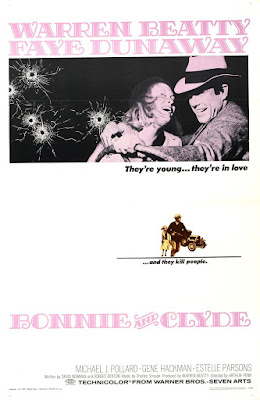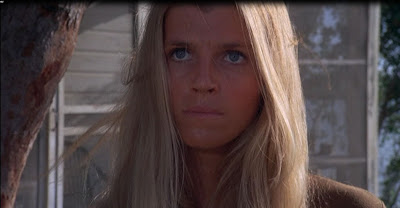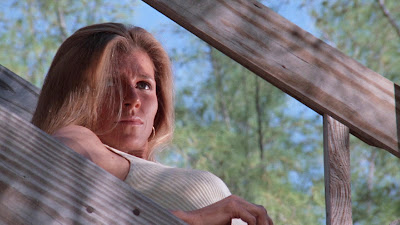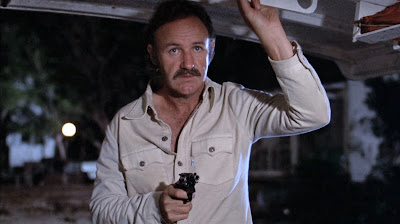Bonnie & Clyde
is one of my “staple films.” A staple film being any movie that tops my
acquisition list whenever technological advancements make it necessary for me to
restock my film library. Back in the dark ages, when I got my first VCR machine,
Bonnie & Clyde, Rosemary’s Baby, and Midnight Cowboy were the first VHS
movies I ever purchased. These same films also became the first DVDs I ever
owned when video cassettes became obsolete. It wasn’t particularly planned that
way, they were just the three films I was most excited about owning in disc
format. As of yet, I haven’t jumped on the Blu-ray bandwagon, but if and when I ultimately
make that leap, it’s a sure bet which three films will be essential to have...again.
Arthur Penn’s Bonnie &
Clyde is a film that has arguably become as legendary and folkloric as its real-life
subjects. Released at the height of the hippie movement (ironically enough,
in August of the Summer of Love) Bonnie
& Clyde, in its myth-making depiction of two small-time Depression-era
outlaws, managed to hit America right between the eyes.
What captured our imaginations about Bonnie Parker and Clyde
Barrow in 1967 is most likely what captured the nation’s imagination in the
1930s. They were young (he was 21, she 19); women in crime were rare; as opposed
to being a “gang,” Bonnie and Clyde were perceived as a “couple” and as such, suitable
for romantic projection; and lastly, but perhaps most significantly, they were
famous. Indeed, they are among the earliest American “celebrity” criminals: self-aware
and image-conscious; knowledgeable of and taking delight in the notoriety and
fame their criminal activity brought them.
Had Arthur Penn’s film been less artful, say, a Roger Corman
exploitationer or an American-International cheapie like1958s The Bonnie Parker Story (an absolutely
must-see howler starring Dorothy
Provine), no one would likely have batted an eye on its release. But Penn’s Bonnie & Clyde comingled French New
Wave arthouse stylization with America’s romanticism of rebellion,
preoccupation with violence, and attraction to mythmaking, and in doing so captured the absolute essence
of a particular moment in time. Not America in the 1930s, but America in the
late 1960s.
 |
| Warren Beatty as Clyde Barrow |
 |
| Faye Dunaway as Bonnie Parker |
 |
| Michael J. Pollard as C.W. Moss |
 |
| Gene Hackman as Buck Barrow |
 |
| Estelle Parsons as Blanche Barrow |
(I literally had no business being in the theater at that
age, but precocious kids who make it their business to see movies too mature
for their age can’t really complain about the subsequent nightmares and
kindertrauma.) *I now own a framed Bonnie & Clyde poster which hangs where I can see it as I write. No longer a terrifying image, it inspires me and reminds me of the time when I thought movies were art and magic combined.
I had seen lots of crime dramas before this, but they were
all pretty cut-and-dried, morally speaking. Crime didn’t pay, the good guys
won, and the bad guys deserved what they got. I was not at all prepared for Bonnie & Clyde’s alternating tones
of comedy, romance, lyricism, drama, and in-your-face violence used in telling
the story of a duo many believed to have been little more than a couple of
hayseed sociopaths.
As embodied by the impossibly (implausibly?) beautiful and
stylish duo of Beatty and Dunaway, Bonnie and Clyde are a pair of
unsophisticated social misfits dreaming of a better life beyond the dustbowl
Texas poverty that surrounds them. Warren Beatty’s Clyde is a kind of
guileless, career-criminal with malice towards none (the film casts the Great
Depression as the ultimate villain) who sees in Bonnie a yearning soul, not
unlike his own. The film seems to allude that, possibly with education or
opportunity, this pair might have made something useful of their lives. But lacking
either and left with nothing but a nagging sense of the pent-up hopelessness of
their lives, they made the choice of antisocial rebellion.
A pretty nice name for a murderous crime spree.
And therein lay the cornerstone of the controversy surrounding
Bonnie & Clyde when it was first
released. Critics and audiences alike didn’t know what to make of a film that
not only intentionally altered (some might say manipulated) historical fact for
the purpose of dramatic effect, but cast its anti-heroes in a decidedly heroic,
romantic light that to some negated the very real pain and suffering this
real-life couple brought to others.
Director Arthur Penn has always maintained that he had
bigger fish to fry in Bonnie & Clyde
and had no interest in offering a documentary with a moral. In the wonderful
but out-of-print volume, The Bonnie &
Clyde Book by Sandra Wake and
Nicola Hayden, Penn is quoted as saying: “I
don’t think the original Bonnie and Clyde are very important except insofar as
they motivated the writing of a script and our making of a movie. This is not a
case study of Bonnie and Clyde; we don’t go into them in any kind of depth.”
Instead, Penn asserts that he intended Bonnie & Clyde as a kind of post - Kennedy assassination /
Vietnam war–era take on the death of the American Dream as manifest in the
nation’s fascination with violence and mythmaking, and the resultant anti-authority/anti-social rebellion.
So if turning a couple of remorseless murderers into a pair
of sympathetic, glamorous, near-mythic tragic lovers was seen by some as
amoral, young '60s audiences didn’t seem to care. While critics like The New York Times’ Bosley Crowther
pilloried Bonnie & Clyde as “…a cheap piece of bald-faced slapstick
comedy that treats the hideous depredations of that sleazy, moronic pair as
though they were as full of fun and frolic as the jazz-age cut-ups in
Thoroughly Modern Millie,” young people across the country
responded (as they would two years later to Easy
Rider’s motorcycle-riding drug dealers) to the rebellious,
anti-establishment spirit at the film’s core.
 |
| Disenfranchised '60s youth - targeted for the draft, denied the vote, lacking a social presence - identified with the Barrow Gang's attempt to create for themselves a non-traditional family |
WHAT I LOVE ABOUT
THIS FILM
Putting aside arguments of amorality, I really admire
how Bonnie & Clyde captures
something I find to be very true about human nature: that the villains and
monsters of the world don’t necessarily perceive themselves to be such. Movies and pulp literature have taught us that bad guys are
well aware of how evil they are; literally reveling in their wickedness and
lack of conscience (to believe so is reassuring when you find yourself rooting for their
demise). Yet life experience and election-year observations have led me to
conclude that some of the most heinous people in our culture actually seem to maintain a perception of themselves as being basically good and “just folks.”
It makes perfect sense to me that neither Bonnie nor Clyde
would ever see themselves as bad guys. Dunaway and Beatty’s scenes together
depict the two as marginalized loners—zeroes in the eyes of the world—whose dead-end
lives converge and create a kind of pitiful, doomed hope. They are a sadsack
Romeo & Juliet made stronger and more significant in their union than they
could ever be on their own.
Their world may be narrow and their thinking delusional,
but they long for the same things we all do. We identify with their taking
offense at the injustice of poor people being put out of their homes by banks,
and we maybe even applaud their standing up for the “little people” in the small
criminal ways they flout authority. Yet at the same time we are repulsed by their
callous disregard for life. Or rather, a certain kind of life. In their world,
the death of a lawman does not hold the same weight as the death of a loved one
or average citizen. A trenchant twist on the way death is militarized by our “civilized society” (The death of an officer in battle does not hold the same weight as the death of a soldier; the death of a lawman in the line of duty does not hold the same weight as that of the average citizen, etc.) Small wonder that 60s youths - their lives valuable in terms of the draft, valueless when it came to the right to vote - found in Bonnie & Clyde a relevant parable for the times. Depicted as a pair of counterculture outlaws, at least Bonnie and Clyde were choosing to die on their own terms.
PERFORMANCES
In some ways, the channeling of a specific, defined persona
into role after role is the essence of what being a movie star (as opposed to
an actor) is all about. Diane Keaton trademarked the lovable, semi-inarticulate
ditz; Robert Redford the sensitive All-American jock; and Warren Beatty always
seemed to play some variation on the not-very-bright, overgrown boy with big
ideas (McCabe & Mrs. Miller, The Only Game in Town, Shampoo). Notwithstanding
Beatty’s appealingly debauched beauty as a man, his screen persona has often
left me wanting. Not so in Bonnie &
Clyde. Here he mines the mother lode of his star charisma and is
marvelously alive and interesting. Especially in the scenes where Clyde explodes into
violent rages that erupt into a terrifyingly real physicality. Beatty playing aw-shucks
humble has always been a little boring. Beatty as a temperamental nutjob (Bugsy) is a sight to behold.
There’s a kind of wistfulness that comes over me whenever I
see Faye Dunaway in Bonnie & Clyde.
Part of it’s nostalgia because I fell in love with her in this movie; part of
it’s due to her being so damned good that I’m forced to admit that I’ve let it become
far too easy over the years to forget what a marvelous actress she is. You see her here and
you know in an instant that there was no way this woman wasn’t going to be a
star. Her Bonnie Parker is funny and tough and oh, so heartbreaking. Hers is a classic,
one-of-a-kind performance and Dunaway OWNS the role as far as I’m concerned.
Any planned remakes would do well to distance themselves from the Penn film and
save all prospective Bonnies from the inevitable embarrassing comparisons to
Dunaway.
 |
| Impotent Clyde seduces Bonnie with a phallic substitute |
THE STUFF OF FANTASY
While the sympathetic light Bonnie and Clyde are presented
in represents an insurmountable hurdle for some (personally, I don’t see it as
sympathetic so much as human. A moral imperative overrides everything that
happens in the film), I find myself grateful for being allowed to take in the
events of the story without being forced by the script to adopt an attitude about
the pair until I’m ready.
One good example of this is the scene where Clyde says to a
poor farmer whose house has been foreclosed upon, “We rob banks!” And in that
split second, we see an aimless man giving his life purpose. A few scenes later
Bonnie says these same words to gas attendant C.W. Moss, and in her delivery, we
see that she at last has discovered an identity for herself, as well.
These two moments of empowerment for Bonnie and Clyde are perhaps
pathetic and delusional to us, the viewer, but they are defining moments for
the characters. What seems like the film striking an amoral stance is
actually, I believe, the film merely establishing its point of view. The film
presumes we are adult enough to be shown Bonnie and Clyde’s self-serving view of the world and themselves (misjudged folk heroes like Robin & Maid Marian) without
insisting we accept it.
THE STUFF OF DREAMS
Or rather, the stuff of nightmares. In this, I’m referring to
Bonnie & Clyde’s groundbreaking, much-discussed,
heavily-debated, then-unprecedented depiction of violence. Modern audiences may
find it tame (me, I still have a hard time watching the final ambush scene) but
everything you’ve read about it is true when it comes to how it affected
audiences on its initial release. I still can remember how ear-shatteringly loud
the shots sounded in the theater, and how deadly quiet the theater was when the
film was over. People walked out of the film like they were in a daze. Nobody
knew quite how to take what they had seen. There were the obvious few, made so nervous
that they had to start saying ANYTHING quick, but I remember my family and me leaving
the theater and actually feeling afraid to say anything. As if in opening our
mouths we weren’t sure what would come out…a cry or a scream.
 |
| Bonnie & Clyde: Laughing and dying "The killing gets less impersonal and, consequently, less funny." Arthur Penn |
Copyright © Ken Anderson 2009 - 2012




























